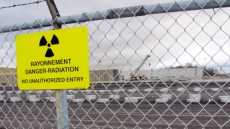OTTAWA — Prime Minister Justin Trudeau returns from an appearance at an international climate change conference with a simple question hanging over his head: What now?
A 90-day countdown is underway before Trudeau meets again with Canada's premiers to hammer out a climate-change framework that would guide federal and provincial efforts in meeting the ambitious talk from the Paris conference.
The provinces will be looking to the federal government for money to help pay for their climate-change commitments. But the Liberals have a slew of spending promises of their own to keep.
And missing from all of it are the details of what the money will buy — details that one expert says would spell out whether the government will be able to keep its commitments.
The first bit of money went out the door Monday when Trudeau promised $300 million to help research and development in the green energy sector, combining money from two funds promised in the Liberal platform. The Liberals promised to spend $200 million per year for the next four years to help green the forestry, fisheries, mining, energy, and agricultural sectors, and promised an additional $100 million to help the production of green technologies.
Erin Flanagan, federal policy director with the Pembina Institute, said there's no simple way to show how much each R&D dollar is worth in terms of emissions reductions, putting the onus on the Liberals to prove their spending is working.
"If the government wants to have public confidence on these expenditures, they will have to bring us into that story," Flanagan said.
"They will have to prove that there is some benefit to Canada, to Canadians and also to this global process of emissions reductions."

Similarly, there is $2 billion budgeted over two fiscal years, starting in 2017, to create a "low-carbon economy trust" that the Liberals promised would dole out cash to "projects that materially reduce carbon emissions." They haven't said what strings will be attached or who will be first in line to access the fund, Flanagan said.
"The government hasn't clearly outlined conditions to access that capital, but it could be used as a tool to reward early action in jurisdictions that are leading on climate change in Canada," she said, suggesting B.C. — which has the highest carbon tax in the country — could be near the front of the line.
But the biggest slice of federal spending comes from the Liberals infrastructure plan.
The Liberals have promised to spend an extra $5.65 billion over the next four years on what it calls green infrastructure, such as wastewater facilities and flood mitigation systems. Another $5.65 billion is for extra spending on public transit over the next four years — subways, light transit or more buses on city streets, all with the aim of reducing the number of cars on Canada's roads.
"The use of public transit is a huge factor in all this," Transportation Minister Marc Garneau said in an interview with The Canadian Press last week.
"If more people are leaving their cars at home and getting into modes of transportation that are public ... that also contributes to reducing greenhouse gas emissions."
About 23 per cent of Canada's greenhouse gas emissions come from the transportation sector, just behind the oil and gas sector, which tops the list.
Reducing emissions in the sector is going to require some strategic spending, Flanagan said. Depending on how the government does its math, it could end up paying for subways in Toronto or more buses in parts of B.C. to meet its emission goals, she said.
"We're talking this very big game — 'We're back, we're back, we're back.' Well, what does that mean?" she said.

"How do our laws change and how do our businesses sort of assume some of that new space — that's the story to watch."



